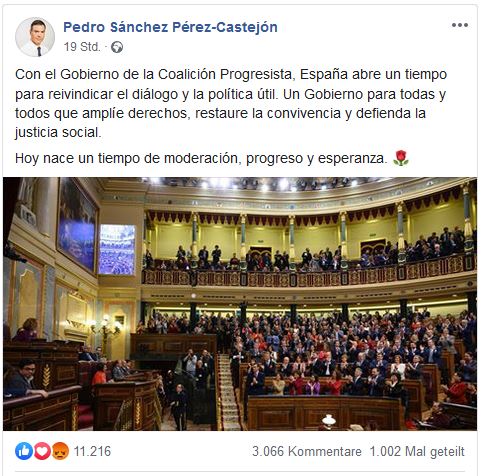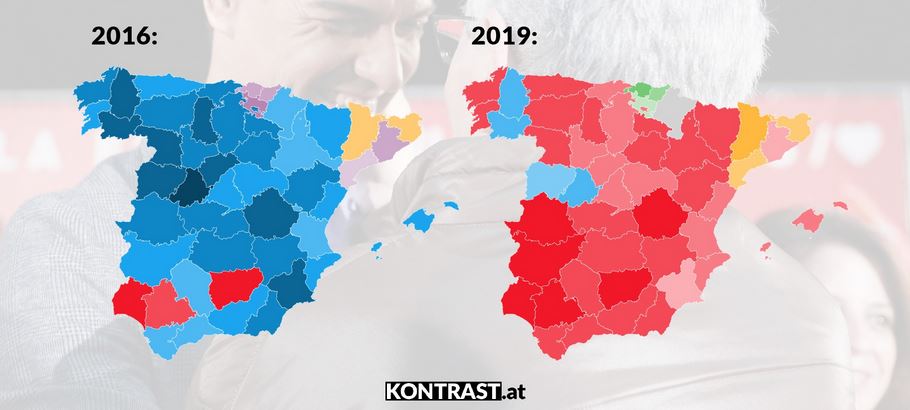After months of political blockade Spain has a government. Pedro Sanchez is heading a coalition government made up of his Socialist Workers’ Party and the Left Party Unidas Podemos. The centre-left government wants to raise minimum wages, tax corporations heavier and small and medium-sized businesses less. In addition, the new government is planing to source 100 percent of their energy from renewable sources and ban single use plastic.
Until the end Pedro Sanchez had to keep his fingers crossed. It was only in the second round that the leader of the Spanish Socialists was able to win enough votes in parliament to form a government. In the Spanish parliament the nerves were on the edge, because for months the country has been unable to find a way out of the political blockade.

Today is a time of moderation, progress and hope.
How Pedro Sanchez coloured Spain in red
Already on 1 June 2018 Pedro Sanchez came to the head of the Spanish government. At that time, the conservative Prime Minister Mariano Rajoy was deposed by a vote of no confidence parliament. The reason: his conservative party Partido Popular was involved in a massive corruption scandal.
Sanchez then led a minority government supported by the left-wing party Unidas Podemos and Basque and Catalan parties. Under this government, the socialists increased the minimum wage by 22%. Sanchez’s government spokeswoman said
“This is the biggest increase in the minimum wage since 1977, benefiting more than 2.5 million people, most of them women.”
In February, Pedro Sanchez announced early parliamentary elections when Catalan separatists withdrew their support from his minority government in the vote on the budget. In the April 2019 elections, the Socialists then scored a resounding victory. While the conservatives lost almost half of their votes, Sachez’s PSOE gained 6% points. The Spanish map turned red.

Despite his election success, he was not able to secure a majority in parliament. The formation of a government failed and new elections were held again in November. The PSOE under Pedro Sanchez was able to win this one as well, despite a slight loss of votes. After the new election victory, the decision was made: The PSOE will form a coalition with Unidas Podemos. This is the first coalition government in Spain since the end of the military dictatorship under Franco.
A government programme for a new Spain under Pedro Sanchez
The government programme of the new coalition is ambitious. At the heart of the programme is the fight against social inequality and the climate crisis. In doing so, the new government is building on the work done by the minority government under Sanchez.
The central issue is the withdrawal of the labour market reforms of the deposed conservative Prime Minister Rajoy. Under the slogan of “labour market flexibilisation”, it was made easier for corporations to dismiss their workers. In addition, collective bargaining was pushed back in favour of individual contracts in order to further weaken the workers interest.
In contrast to the conservative government, the new left-wing government relies on redistribution to boost the economy. Large corporations are to pay more taxes, while the tax burden on small and medium-sized enterprises will fall.
In addition, those who earn more than 130,000 euros a year will be required to pay a bit more. At the same time, the government is raising the minimum wage even further. Pedro Sanchez’s goal is for the minimum wage to be 60% of the average wage.
Another important measure in the fight against social inequality and poverty is a planned rent cap. This is to be applied in areas where rents have risen particularly sharply. Many people in Spain have lost their homes during the economic crisis because of high rents and low incomes.
Fight against the climate crisis
The new government is also ambitious on environmental issues. A core element of the environmental plan: By 2050, Spain should generate 100% of its electricity from sustainable sources. In addition, there will be a ban on single use plastic and the expansion of public transport. These measures are integrated in a national action plan on climate and energy.
